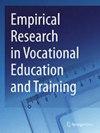经济变化与工作经历中的持续职业培训:1970-2008 年德国雇员参加进修培训及其对职业生涯影响的纵向多层次分析
IF 3.1
Q2 EDUCATION & EDUCATIONAL RESEARCH
Empirical Research in Vocational Education and Training
Pub Date : 2019-02-09
DOI:10.1186/s40461-019-0079-x
引用次数: 0
摘要
本文运用人力资本理论和生命历程视角,研究了经济现代化以及西德 "经济奇迹 "之后劳动力市场的发展如何影响雇主提供的在职进修和培训,以及雇员对这些安排的更多参与。此外,在控制上述结构变化和经济周期的情况下,我们还分析了参加进修培训是否能最大限度地降低员工被解雇的风险,以及是否能提高他们对公司的忠诚度。假设利用纵向数据和时间序列进行了检验,通过动态多层次设计中的事件史分析和情节分割程序,分析了 1972-2008 年间员工参加在职进修和培训的情况,以及 1956-1978 年间出生的西德人的职业生涯。研究揭示了经济和劳动力市场的结构性变化对企业提供和员工参加在职继续职业培训的系统性时期和队列效应。参加继续培训降低了员工被解雇的风险,也降低了他们在公司之间的流动性。参与者通过与工作相关的进修培训来适应结构性变化,这与就业保障、职业灵活性和对雇主的承诺的增加有关。本文章由计算机程序翻译,如有差异,请以英文原文为准。
Economic change and continuous vocational training in the work history: a longitudinal multilevel analysis of the employees’ participation in further training and the effects on their occupational careers in Germany, 1970–2008
Human capital theory and the life-course perspective are used to investigate how economic modernisation, as well as developments in the labour market after the West German “economic miracle”, impacted employers’ supply of further education and training on the job, and employees’ increased participation in these arrangements. Additionally—controlling for the aforementioned structural change and economic cycles—it is analysed whether participation in further training minimises employees’ risk of dismissal and heightens their commitment to a company. The hypotheses are tested using longitudinal data and time series—allowing the analysis of employees’ participation in further education and training on the job, and the careers of West Germans born between 1956 and 1978 for the 1972–2008 periods—by procedures of event history analysis and episode splitting in a dynamic multi-level design. Systematic period and cohort effects of structural change in the economy and labour markets on companies’ supply of, and employees’ participation in, continued vocational training on the job have been revealed. Participation in further training reduces employees’ risk of dismissal, as well as their mobility between companies. Participants’ adaptation to structural change via job-related further training is correlated with increased employment security, professional flexibility, and commitment to the employer.
求助全文
通过发布文献求助,成功后即可免费获取论文全文。
去求助
来源期刊

Empirical Research in Vocational Education and Training
Social Sciences-Education
CiteScore
3.40
自引率
7.70%
发文量
9
审稿时长
13 weeks
期刊介绍:
The main focus of this journal is to provide a platform for original empirical investigations in the field of professional, vocational and technical education, comparing the effectiveness, efficiency and equity of different vocational education systems at the school, company and systemic level. The journal fills a gap in the existing literature focusing on empirically-oriented academic research and stimulating the interest in strengthening the vocational part of the educational system, both at the basic and higher education level.
 求助内容:
求助内容: 应助结果提醒方式:
应助结果提醒方式:


